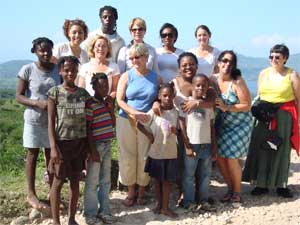By Cathleen Twardzik Even as the earthquake in Haiti has faded from the headlines, Haitian-Americans in Somerville continue to volunteer and offer aid to their struggling home country. Somerville Haitian Coalition volunteers recently returned from a two-month long mission to the country, where they helped deliver medical assistance and mental health counseling to 1,200 survivors, distributed supplies, food, clothing, beds, temporary shelter and other materials to 1,300 survivors, and provided CPR training to 60 women. |
|||
Organizers of the mission said the project allowed Somerville Haitians to listen to the Haitian people's concerns in order to create and implement better projects. However, they said they were surprised at the slow pace of recovery.
"We expected to see forklifts, tractors and other signs of construction. With all the donations made, pledges promised and funds collected on behalf of Haiti, we expected to see more," Haitian Coalition Executive Director Franklin Dalembert said. "Bodies are still buried under the rubble. When you enter the camps [tent settlements], there are no case workers working to assist survivors, to direct them to services available to them and address their needs."
As Haitian Coalition members return to the U.S., another Haitian Somerville resident is leaving, hoping to help the distressed country.
Leon David said he is going with "a non-profit, multi-disciplinary, consumer governed, primary care medical practice, and clinical affiliate of Commonwealth Care Alliance."
David ventured to the country in May — to Port-au-Prince, the capital, and Jacmel, his hometown — to attend his grand aunt's funeral, whose death occurred as a result of health complications after the earthquake.
In the January earthquake, David lost two family members, while others sustained serious injuries.
While in Haiti, David had the chance to "survey the impact of the quake with my own two eyes."
The current conditions are dismal.
"Port-au-Prince and Jacmel look like a scene from a WWII air raid," said David. "I saw images, throughout, of damaged and flooded streets, piles and piles of trash, on top of more trash."
"Broken and collapsed buildings and homes, some at least a story high, paint the skyline. There are tents, make-shift shacks of blankets, cardboard, pieces of plastic and woven palm leaves. The capital seemed more crowded then I've ever seen it. What property that hasn't collapsed [is] now re-occupied – some cramming more people in them [than] before the quake," said David.
By day, damaged houses are used, but individuals occupy tents at night "in anticipation of any further calamity — the crowded streets, full of clamor of chaos and reeking of decomposing garbage mixed with diesel soot."
Upon arrival on his upcoming trip, David will provide assistance "with translating and working with behavioral health along with other social workers in the team."
What prompted David to make the trek to Haiti?
Human suffering, as well as his feeling, "impotent, weak and powerless," serve as the main reasons for his trip. Moreover, his family is experiencing an unfathomable tragedy.
"In a way, it is a way for me to deal with my own trauma, by taking charge of the situation. I've never felt a feeling as horrible as wondering if your family is dead and not even being in a position to reach them," said David.
The three types of assistance, which are the most needed in Haiti, at present, are agriculture, education, and health, he said.
"Many people have been hurt in Haiti, mentally and physically. In addition, investing in a strong health system will ensure that Haiti is on the trajectory of prosperity," he said.
David believes that Haitian-Americans living in the United States should be held responsible to help Haiti in several ways.
First, "Haitian-Americans need to organize, [and to] learn that sometimes being a leader is also about taking direction from others," he said. Additionally, financial contributions, "in responsible ways" are needed.
"They have the obligation of keeping this tragedy in the forefront. The availability of food is sparse, and the cost of living very high. People are still living a traumatized existence," said David.
















Reader Comments